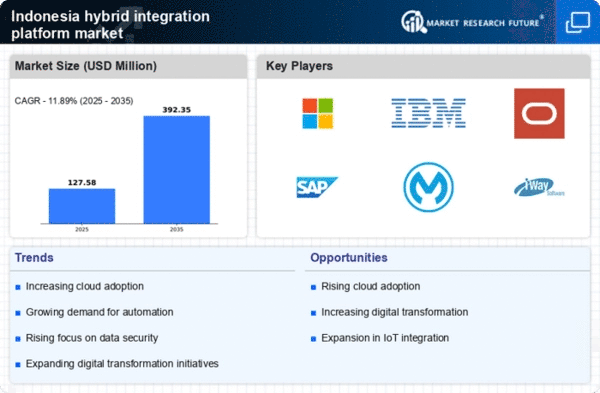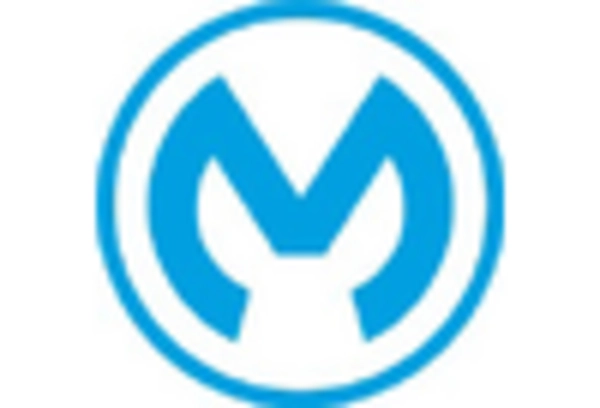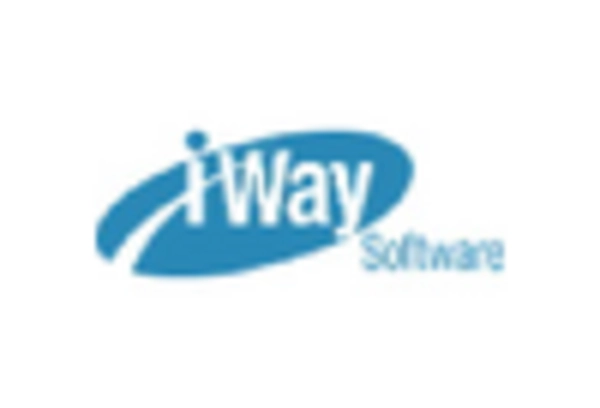Increasing Cloud Adoption
The hybrid integration-platform market in Indonesia is experiencing a notable surge due to the increasing adoption of cloud technologies. Organizations are migrating their operations to cloud-based solutions, which necessitates seamless integration between on-premises systems and cloud applications. This trend is reflected in the growing number of cloud service providers in the region, with a reported increase of 30% in cloud adoption rates over the past year. As businesses seek to enhance operational efficiency and reduce costs, the demand for hybrid integration platforms that facilitate this transition is likely to rise. Furthermore, the hybrid integration-platform market is poised to benefit from the need for scalable solutions that can accommodate fluctuating workloads and diverse application environments, thereby driving further growth in the sector.
Regulatory Compliance Requirements
In Indonesia, the hybrid integration-platform market is significantly influenced by the stringent regulatory compliance requirements imposed on businesses. Organizations are increasingly required to adhere to data protection laws and industry-specific regulations, which necessitate robust integration solutions that ensure data integrity and security. The market is witnessing a shift towards platforms that offer compliance features, such as data encryption and audit trails. This trend is underscored by the fact that approximately 45% of companies in Indonesia have reported challenges in meeting compliance standards without adequate integration solutions. As regulatory scrutiny intensifies, the hybrid integration-platform market is likely to see a surge in demand for solutions that not only facilitate integration but also ensure compliance with local and international regulations.
Rising Focus on Customer Experience
In Indonesia, the hybrid integration-platform market is increasingly influenced by the rising focus on enhancing customer experience. Businesses are recognizing that seamless integration of various customer touchpoints is essential for delivering a cohesive and personalized experience. This trend is particularly relevant in sectors such as e-commerce and telecommunications, where customer expectations are rapidly evolving. Recent surveys indicate that companies prioritizing customer experience initiatives are likely to see a 20% increase in customer retention rates. As organizations strive to meet these expectations, the hybrid integration-platform market is expected to grow, driven by the demand for solutions that enable the integration of customer data across multiple channels, thereby facilitating a more unified customer journey.
Growing Need for Real-Time Data Processing
The hybrid integration-platform market in Indonesia is increasingly driven by the growing need for real-time data processing capabilities. As businesses strive to make data-driven decisions, the ability to integrate and analyze data in real-time has become paramount. This demand is particularly evident in sectors such as finance and retail, where timely insights can significantly impact operational efficiency and customer satisfaction. Recent studies indicate that organizations leveraging real-time data integration experience a 25% improvement in decision-making speed. Consequently, the hybrid integration-platform market is likely to expand as companies seek solutions that enable seamless data flow and processing across various applications and systems, thereby enhancing their competitive edge.
Expansion of Digital Transformation Initiatives
The hybrid integration-platform market in Indonesia is witnessing robust growth due to the expansion of digital transformation initiatives across various industries. Organizations are increasingly investing in technologies that enhance their digital capabilities, which often necessitates the integration of legacy systems with modern applications. This trend is reflected in the fact that over 60% of Indonesian companies have initiated digital transformation projects, with many citing integration as a critical component of their strategy. As businesses seek to streamline operations and improve customer experiences, the demand for hybrid integration platforms that facilitate this transformation is expected to rise. The hybrid integration-platform market is thus positioned to capitalize on this trend, providing solutions that support the seamless integration of diverse technologies.
















